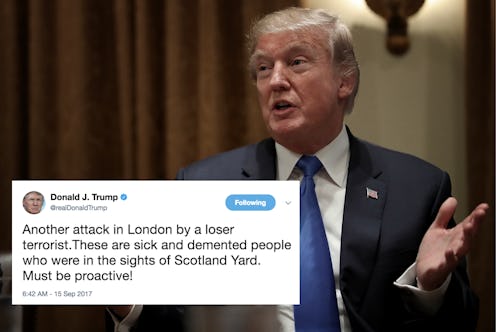News
Trump Calls The London Attacker "Loser Terrorist" & Pushes For The Travel Ban

An explosion in a London Underground train on Friday morning rocked the city, injuring at least 18 people. While the police have declared it a terrorist incident, there is no word yet on whether any arrests have been made. For President Trump, a response came swiftly on Twitter. Hours after the London Underground blast, Trump tweeted about "loser terrorists" and renewed calls for a "larger, tougher" travel ban.
This is a striking departure from how Trump responded to the recent terrorist attack in Charlottesville, Virginia. Trump came under criticism for his hesitation to condemn the violence from neo-Nazis and white supremacists, one of whom caused the death of counter-protester Heather Heyer. In defense of his reaction, Trump said he wanted to "know all the facts" before weighing in.
It's clear all the facts remain unknown in the Parsons Green explosion, but Twitter still heard from the POTUS. Even after judicial strike downs of Trump's proposed ban on travelers from several Muslim-majority countries, the president remains convinced that religious and ethnic profiling is the way to go. Besides advocating for expanding the travel ban, Trump went on to suggest that perhaps restricting access to the internet could fall under the banner of fighting terrorism.
It's important to reiterate here that there is no public information on any persons of interest in the Parsons Green bombing. Ergo, it would seem Trump is making an assumption on the identity of the attacker(s) — that said person is of Middle Eastern background and/or could be described as "Muslim." Otherwise, there is no discernible rationale for Trump's jump from condemning the "loser terrorist" to his immediate call for a "larger, tougher" travel ban.
This free-wheeling presumption has not gone unnoticed. British police weighed in on Trump's tweets, calling them "unhelpful." Speaking with CNN, a police spokesperson called Trump's comments "pure speculation," adding that "any speculation is unhelpful."
Besides again voicing his desire for a travel ban, Trump's tweets also raised the issue of online recruitment, which he wrote, "We must cut off [and] use better."
The problem of terrorists utilizing the internet to spread propaganda and recruit is not a new one. In fact, in December, four of the world's largest online sharing sites — Facebook, Twitter, Microsoft, and YouTube — announced a joint effort to combat the online distribution of violent jihadist imagery. The plan involves assigning each removed image or video a unique code that allows the other three sites to find it within their own database, expediting the removal process.
These types of efforts, while commendable in the short term, have some concerned about the extent to which the internet should be censored. The editorial board at the Los Angeles Times outlined some of the potential complications such a policy could yield down the road. For instance, would sermons from clerics deemed "extremists" also be removed? What about propaganda imagery that includes real documentation, such as photos from Abu Ghraib prison? Looming large over the debate is the question of who decides what constitutes an online threat of terrorist recruitment.
The government would have an even more difficult time navigating this thorny issue. Unlike privately owned companies, federal policy must not violate any citizen's constitutional rights, including the First Amendment. Americans who find themselves compelled by Jihadist ideology have a legally protected right to speak about it.
But as Trump's efforts with implementing his travel ban suggest, the 45th president is not put off by legal challenges. While London police were searching for the perpetrator of Friday morning's terror attack, Trump saw a chance to re-up his commitment to a travel ban aimed at Middle Eastern visitors. Perhaps it's not surprising he'd also be willing to take on free speech.
More to come...